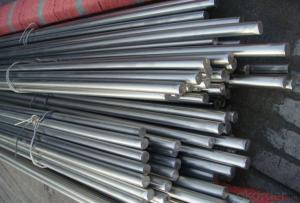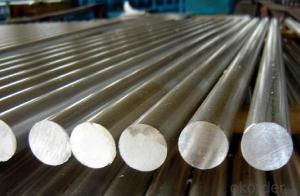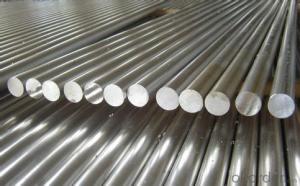ASTM A484 Standard 304 Stainless Steel Round Bar Polished
- Loading Port:
- Shanghai
- Payment Terms:
- TT OR LC
- Min Order Qty:
- 3 m.t.
- Supply Capability:
- 10000 m.t./month
OKorder Service Pledge
OKorder Financial Service
You Might Also Like
Item specifice
ASTM A484 Standard 304 Stainless Steel Round Bar Polished
Details of StainASTM A484 Standard 304 Stainless Steel Round Bar Polished
Name | Stainless Steel Round Bar |
Shape | Round Bar/Square Bar/Flat Bar/Plate/Wire |
Standard | GB/ASTM/SAE/AISI/DIN/JIS/EN/BS |
Surface Treatment: | Black/Peeling/Polished/Machined |
Delivery Condition: | Hot Rolled or Forged/Peeled or Black Surface |
Test | SGS/UT 100% Elements Testing |
Certificate: | ISO/Mill Certificate |
Service: | 24 hours online service / |
more than 20 years trading and manufacture | |
Quality Assurance: | the third party inspection, such as SGS, BV, TUV…etc. is acceptable |
Packaging Details: | Seaworthy Packaging or as per customer's packing instruction |
Specification of ASTM A484 Standard 304 Stainless Steel Round Bar Polished
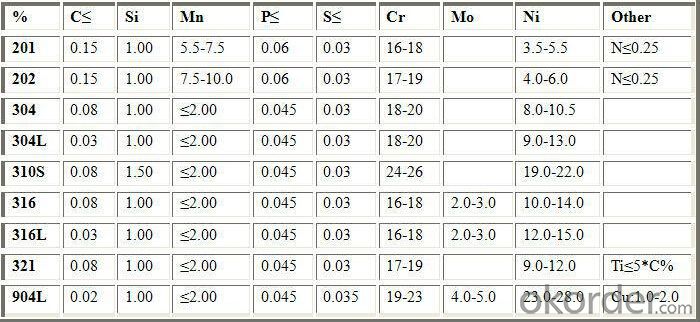
CNBM Introduction of ASTM A484 Standard 304 Stainless Steel Round Bar Polished
CNBM International Corporation is the most import and export platform of CNBM group(China National Building Material Group Corporation) ,which is a state-owned enterprise, ranked in 270th of Fortune Global 500 in 2015.
With its advantages, CNBM International are mainly concentrate on Cement, Glass, Iron and Steel, Ceramics industries and devotes herself for supplying high quality series of refractories as well as technical consultancies and logistics solution.
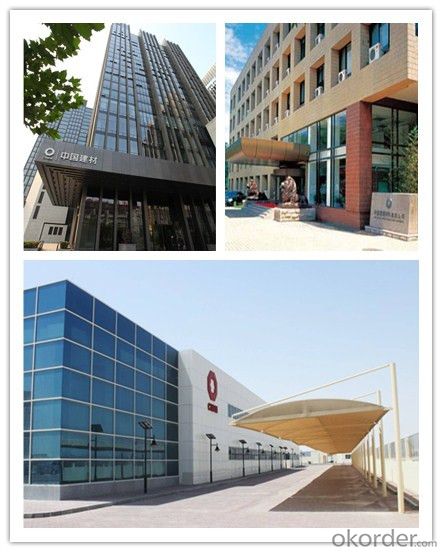
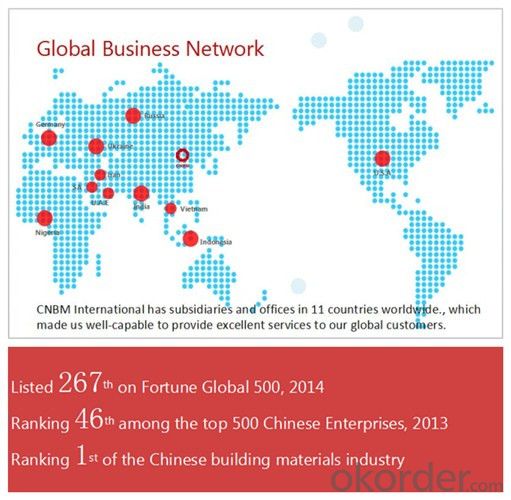
After-sale service |
|
Advantages
|
|
Packaging & Delivery of ASTM A484 Standard 304 Stainless Steel Round Bar Polished
Packaging Detail | Sea worthy packing /as per customer's packing instruction |
Delivery Detail | 15 ~ 40 days after receiving the deposit |
Products Show
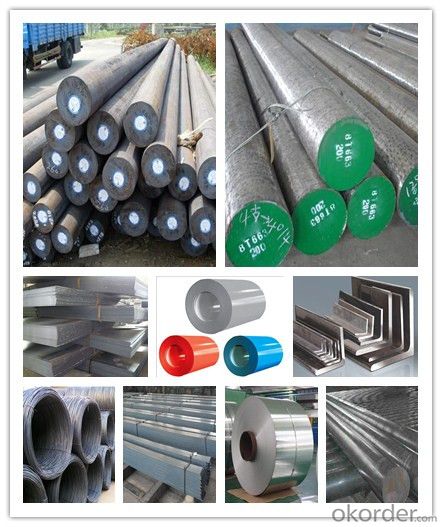
FAQ:
Are you a trading company or manufacturer? | Manufacturer |
What’s the MOQ? | 3 metric ton |
What’s your delivery time? | 15-35 days after downpayment received |
Do you Accept OEM service? | Yes |
what’s your delivery terms? | FOB/CFR/CIF |
What's the Payment Terms? | 30% as deposit,70% before shipment by T/T |
Western Union acceptable for small amount. | |
L/C acceptable for large amount. | |
Scrow ,Paybal,Alipay are also ok | |
Why choose us? | Chose happens because of quality, then price, We can give you both. Additionally, we can also offer professional products inquiry, products knowledge train (for agents), smooth goods delivery, excellent customer solution proposals. |
What's your available port of Shipment? | Main Port, China |
What’s your featured services? | Our service formula: good quality+ good price+ good service=customer's trust
|
Where are your Market? | Covering more than 160 countries in the world |
- Q:What are the challenges in heat treatment of special steel?
- Some challenges in the heat treatment of special steel include achieving the desired hardness and strength without compromising other properties, such as toughness and corrosion resistance. Special steels often have complex compositions, which can make it difficult to accurately control the heat treatment process. Additionally, heat treatment of special steel can be time-consuming and costly due to the need for precise temperature and time control, as well as the potential for distortion or cracking during the heat treatment process.
- Q:How does special steel contribute to the manufacturing of surgical instruments?
- Special steel, which is also known as stainless steel, plays a vital role in the production of surgical instruments. Its exceptional properties make it an ideal material for manufacturing high-quality surgical instruments used in various medical procedures. To begin with, special steel exhibits a high resistance to corrosion and rust. Surgical instruments are constantly exposed to bodily fluids, sterilization processes, and harsh cleaning agents. The corrosion resistance of special steel guarantees the durability of these instruments, enabling them to withstand repeated use and cleaning without compromising their integrity. Furthermore, special steel possesses excellent strength and hardness characteristics. Surgical instruments must be robust and capable of withstanding the forces and pressures exerted during surgeries. The high strength and hardness of special steel ensure that these instruments retain their shape and sharpness even after multiple uses, minimizing the risk of breakage or deformation during critical procedures. Moreover, special steel is biocompatible, meaning it does not elicit reactions or complications when in contact with bodily tissues or fluids. This is particularly important for surgical instruments that come into direct contact with patients' bodies. The biocompatibility of special steel guarantees that there are no adverse reactions or complications when these instruments are used in surgeries, thereby reducing the risk of infections or other complications. In addition, special steel is highly machinable and can be easily molded into intricate shapes and designs. Surgical instruments require precision and accuracy to effectively fulfill their intended functions. The machinability of special steel allows manufacturers to create complex instruments with fine details and features, ensuring their optimal performance during surgical procedures. Furthermore, special steel can be efficiently sterilized. Sterilization is a critical step in ensuring the safety and effectiveness of surgical instruments. Special steel's ability to withstand high temperatures and various sterilization methods, such as autoclaving or ethylene oxide gas sterilization, makes it an ideal choice of material for surgical instruments. In conclusion, special steel significantly contributes to the manufacturing of surgical instruments due to its corrosion resistance, strength, biocompatibility, machinability, and sterilization capabilities. These properties guarantee that surgical instruments made from special steel are durable, reliable, safe, and effective in medical procedures, ultimately enhancing the success of surgeries and improving patient outcomes.
- Q:What are the applications of special steel in the automotive manufacturing process?
- Special steel is used in various applications within the automotive manufacturing process. It is commonly used for the production of engine components, such as crankshafts, camshafts, and connecting rods, due to its high strength, durability, and heat resistance. Special steel is also utilized in the manufacturing of suspension systems, steering components, and transmission parts, as it provides excellent fatigue resistance and wear properties. Additionally, special steel is employed for producing safety-related components like seat belt buckles and structural reinforcements, ensuring the overall safety and reliability of vehicles.
- Q:What are the recycling options for special steel?
- Recycling options for special steel typically involve two main processes: reusing and remelting. Special steel, such as stainless steel or alloy steel, can be reused in various industries and applications after undergoing refurbishment and quality checks. If the steel is no longer suitable for reuse, it can be remelted in steel furnaces to produce new steel products while conserving valuable resources and reducing environmental impact.
- Q:How does maraging steel achieve high strength through aging?
- Maraging steel achieves high strength through a process called aging, which involves heating the steel at a specific temperature for a specific duration. During aging, the alloying elements in maraging steel precipitate into fine particles, creating a strengthening effect. This process enhances the steel's hardness, tensile strength, and resistance to deformation, resulting in its high strength properties.
- Q:What are the challenges in recycling special steel?
- Recycling special steel poses several challenges due to its unique composition and properties. Firstly, special steel is often alloyed with various elements to enhance its strength, durability, and corrosion resistance. These alloys can make the recycling process more difficult and complex compared to recycling common steel. One of the main challenges is the separation of special steel from other metals during the recycling process. Special steel may contain rare and valuable elements such as nickel, chromium, and molybdenum, which are essential for its unique properties. Separating these elements from other metals requires advanced techniques and specialized equipment, increasing the complexity and cost of recycling. Another challenge is the presence of impurities in special steel. These impurities can be introduced during the manufacturing process or through contamination during use. Removing these impurities is crucial to ensure the recycled steel meets the required specifications for its intended applications. However, the high melting point and resistance to purification of some impurities may complicate the recycling process. Furthermore, the physical characteristics of special steel, such as its high hardness and toughness, can make it challenging to handle and process during recycling. Special steel often requires more energy-intensive methods, such as shredding or melting at higher temperatures, which can increase the overall cost and environmental impact of the recycling process. Moreover, the economic viability of recycling special steel can be a challenge. The market demand for special steel may fluctuate, making it difficult for recyclers to ensure a consistent and profitable supply. Additionally, the costs associated with the collection, transportation, sorting, and processing of special steel can be higher compared to common steel, further impacting the economic feasibility of recycling. In conclusion, the challenges in recycling special steel primarily stem from its complex composition, the need for separation from other metals, the presence of impurities, the physical characteristics of the material, and the economic viability of the recycling process. Addressing these challenges requires innovative technologies, efficient separation methods, and a sustainable market demand for recycled special steel.
- Q:How does special steel perform under high-temperature oxidation?
- Special steel is engineered to exhibit outstanding performance when exposed to high temperatures, particularly in terms of oxidation. It is fabricated utilizing alloys that possess a significant quantity of chromium, which generates a shielding chromium oxide layer on the steel's surface once confronted with elevated temperatures. This chromium oxide layer acts as a barrier, thwarting further oxidation and safeguarding the steel against corrosion. The generous amount of chromium present in special steel also heightens its resistance to scaling, which refers to the development of thick layers of oxide on the steel's surface. Scaling can compromise the steel's integrity and result in failure when subjected to high temperatures. Nonetheless, special steel retains its structural soundness even at elevated temperatures due to its capacity to resist scaling. Apart from chromium, special steel may contain additional alloying elements like nickel, molybdenum, and vanadium. These elements contribute to the steel's resistance to high-temperature oxidation by further augmenting the formation and stability of the protective oxide layer. Overall, special steel exhibits exceptional performance under high-temperature oxidation circumstances. Its distinctive composition and alloying elements enable it to establish a protective oxide layer, resist scaling, and retain its strength and integrity even at elevated temperatures. As a result, it is extensively utilized in various industries that involve high-temperature applications, including power generation, aerospace, and petrochemical industries.
- Q:How does special steel perform in defense applications?
- Special steel performs exceptionally well in defense applications due to its high strength, durability, and resistance to extreme conditions. It offers superior protection against ballistic threats, corrosion, and impact, making it ideal for armor plating, military vehicles, and personal protective equipment. Additionally, special steel's ability to withstand high temperatures and maintain structural integrity ensures reliable performance in critical defense systems such as missiles, submarines, and aircraft carriers. Overall, special steel plays a crucial role in enhancing the safety and effectiveness of defense applications.
- Q:What is the role of heat treatment in special steel?
- Heat treatment plays a crucial role in enhancing the properties and performance of special steel. Special steel refers to alloys that are specifically designed to have unique characteristics, such as high strength, corrosion resistance, or heat resistance. Heat treatment involves subjecting the steel to controlled heating and cooling processes to alter its microstructure, resulting in desired properties. One of the key roles of heat treatment in special steel is to improve its mechanical properties. By carefully controlling the heating temperature and cooling rate, the steel's hardness, strength, and toughness can be enhanced. For example, through processes like quenching and tempering, special steel can be made significantly stronger and more resistant to wear and fatigue. This makes it suitable for applications where high strength and durability are required, such as in the construction of machinery, tools, or aerospace components. Heat treatment also helps to optimize the steel's resistance to corrosion. Special steel is often used in environments where it is exposed to harsh conditions, such as corrosive chemicals or high temperatures. By subjecting the steel to specific heat treatment processes, like annealing or precipitation hardening, the steel can develop a more stable microstructure that improves its resistance to corrosion and oxidation. This ensures that the special steel maintains its integrity and performance even in challenging environments. Furthermore, heat treatment can modify the steel's heat resistance properties. Special steel is frequently used in applications where it is exposed to high temperatures, such as in the manufacturing of turbines or exhaust systems. Through heat treatment techniques like normalization or hardening, the steel can be made more resistant to deformation, cracking, or softening at elevated temperatures. This enables the special steel to retain its strength and structural integrity even under extreme heat conditions. In summary, heat treatment plays a crucial role in optimizing the mechanical, corrosion resistance, and heat resistance properties of special steel. By carefully manipulating the steel's microstructure through controlled heating and cooling processes, heat treatment enhances the steel's strength, durability, and performance, making it suitable for a wide range of demanding applications.
- Q:How does special steel perform in high-temperature oxidation?
- Special steel performs well in high-temperature oxidation due to its enhanced resistance to heat and corrosion. It exhibits superior strength and stability, retaining its mechanical properties even at elevated temperatures. Additionally, the presence of alloying elements like chromium, nickel, and molybdenum in special steel forms a protective oxide layer that prevents further oxidation. This makes special steel an ideal choice for applications requiring resistance to high-temperature oxidation, such as in aerospace, power generation, and chemical industries.
1. Manufacturer Overview |
|
|---|---|
| Location | |
| Year Established | |
| Annual Output Value | |
| Main Markets | |
| Company Certifications | |
2. Manufacturer Certificates |
|
|---|---|
| a) Certification Name | |
| Range | |
| Reference | |
| Validity Period | |
3. Manufacturer Capability |
|
|---|---|
| a)Trade Capacity | |
| Nearest Port | |
| Export Percentage | |
| No.of Employees in Trade Department | |
| Language Spoken: | |
| b)Factory Information | |
| Factory Size: | |
| No. of Production Lines | |
| Contract Manufacturing | |
| Product Price Range | |
Send your message to us
ASTM A484 Standard 304 Stainless Steel Round Bar Polished
- Loading Port:
- Shanghai
- Payment Terms:
- TT OR LC
- Min Order Qty:
- 3 m.t.
- Supply Capability:
- 10000 m.t./month
OKorder Service Pledge
OKorder Financial Service
Similar products
New products
Hot products
Related keywords
